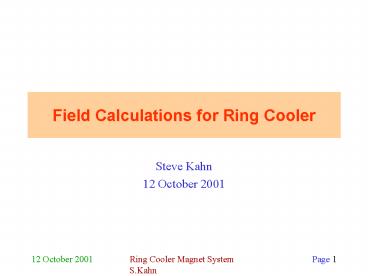Ring Cooler Magnet System
1 / 19
Title: Ring Cooler Magnet System
1
Field Calculations for Ring Cooler
- Steve Kahn
- 12 October 2001
2
Ring Cooler Geometry
TOSCA finite element program models one octant of
ring.
3
Approach to Field Calculations
- The smallest geometric symmetry unit is the
octant. This is not the smallest magnetic
symmetry unit because of the field flips. - If we can assume that the magnet iron is linear
we can separate the octant into sub-regions - Large Solenoid
- Wedge Dipole
- Small Solenoid
- We can calculate the contributions of these
magnets and add them. - We can evaluate how good an approximation this
is. - The alternative would be to treat the system as a
whole. - The finite element problem would have 1000000
nodes and would take a very long time to run! - This is not a simple topology for programs like
TOSCA.
4
Dipole Magnet Specifications
- The preliminary parameters of the bending magnet
as provided - Bending Radius Rbend 52 cm
- Bending Angle ?bend 45º
- Field Strength B 1.46 T at reference radius
- Normalized Field Gradient
- dBy/dx ? (R/Bo) -0.5
- Radius of aperture Raperture 17 cm.
5
Sketch of Dipole Magnet
Pole face is shaped to achieve required gradient
The design of the wedge magnet is from P.
Schwandt (dated 30 Jan 01). It has been revised.
6
Saturation in Dipole Magnet
- Figure shows the permeability for the vertical
midplane of the magnet. - ?lt10 on inner edge of the aperture.
7
By along Vertical Symmetry Plane
- Figure shows three curves
- Ideal Field
- 2D field from shaped iron pole and effective yoke
width. - Calculate index0.473
- 3D Field Calculation
- Calculation using TOSCA
- Gives index0.47
- 2D cylindrical Calculation
- Uses same pole profile, but has closed cylinder
out of plane.
8
Dipole Field along Reference Path
Figure 4 Field components for a path displaced
10 cm vertically from the reference path
Figure 3 By along central reference path.
9
Avoiding a 3D Map
- The 2D part of a long accelerator magnet is
traditionally parameterized by Fourier harmonics. - A generalization of the traverse field that takes
into account the s dependence of the field has
the form
10
Transverse Harmonics as a Function of s
Calculated along the reference path
11
Dipole Profile Fits
Fit to tanhk(x-?)-tanhk(x?)
12
Tosca Model for Wedge Dipole
95 cm radius
End of Return Iron for Large Solenoid
15 cm endplate
10 cm gap between dipole and shield
Coils in this Model are assumed to be
superconducting
13
Long Solenoid Magnet
Vanadium Permadur End Plate
Thick Flux Return
coil
Field Clamp
14
Fields in Long Solenoid
15
Comments on Solenoid Field
- The end plate effectively separates the solenoid
field from the dipole for the case with small
aperture coils. - This still has to be shown for the large coil
case. - Radial field are present only in vicinity of end
plate. - Extend approximately one coil diameter (as
expected).
16
Short Solenoid Magnet
17
Short Solenoid Fields
18
Field Maps
- The TOSCA program can generate 3D field grids.
- Wedge Dipole
- Opera2D is used to generated the following grids
with 1 cm?1 cm segmentation - Large Solenoid
- Tail of Dipole in Large Solenoid
- Tail of Dipole in Small Solenoid
- Small Solenoid
- The gufld (or guefld) subroutine in GEANT will
have to keep track of which octant it is in,
which grid it should use and what signs to apply
to the field for each point in space.
19
Field in Geant































